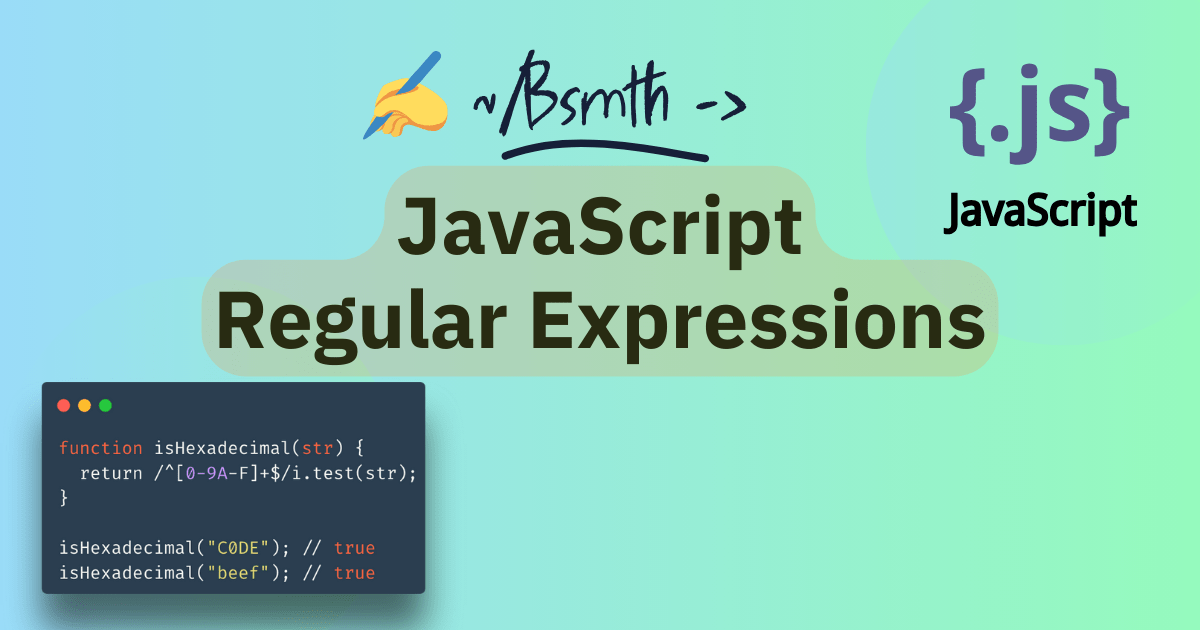
JavaScript regular expressions reference docs
The JavaScript regular expressions (regex) documentation had a big update recently thanks to the efforts of Joshua Chen. Josh did the heavy lifting, and I was glad to give some feedback and reviews to land the changes. There are new, dedicated pages for each JS language feature for regular expressions, with information about the syntax and browser compat data, too.
MDN Blog, JavaScript regular expressions
If you want to see everything that’s changed, we published a post on the MDN Blog that covers highlights and specifics of what’s been updated. Check it out if you want to read the guides for creating regular expressions in JavaScript and other pages that cover:
- flags that change how a regex is interpreted
- assertions to check if a pattern matches a condition (e.g., start of a string)
- atoms - the units that make up a regex pattern
- other features like quantifiers (
*,+,?etc.) that help you compose patterns
Out of the examples, I highlighted a few in the blog post that I thought were nice and are useful for certain purposes. The one below is nice because it detects strings in specific scripts or writing systems without having to exhaustively specify the characters or ranges of characters that make a script:
const mixedCharacters = "aεЛ";
// I could write out everything ...
// mixedCharacters.match(/[ΑαΒβΓγΔδΕεΖζΗηΘθΙιΚκΛλ... <-- oh no
// Or use a short alias for Greek instead:
mixedCharacters.match(/\p{Script=Grek}/u); // ε
// Or a short name
mixedCharacters.match(/\p{sc=Cyrillic}/u); // ЛGitHub PRs updating JS regex
Here’s the two main GitHub PRs that we worked on to add the updates:
- MDN Content: Regex reference (by Josh Cena)
- Browser Compat Data: feat(JS): Add JS regex patterns
For the Browser Compat Data, I had to cover a lot of cases across multiple browsers and operating systems. I did this using Browserstack with a codepen like the one below so I could visually check for matches as a kind of smoke test. Of course, you could do asserts with test() and automate this headlessly, but this was the quickest way to check for passing cases and fill in the blanks. Sometimes simply brute-forcing the permutations of a feature is the most foolproof way:
<!--pen:pen_id_regex-one-->
<ol>
<li id="backreference">backreference: "oneone"</li>
<li id="capturingGroup">capturing group: "capturing group"</li>
<li id="characterClass">character class: "tuv xyz"</li>
<li id="characterClassEscape">character class escape: "1"</li>
<li id="characterEscape">character escape: "	"</li>
<li id="disjunction">disjunction: "b"</li>
<li id="inputBoundaryAssertion">input boundary assertion</li>
<li id="lookaheadAssertion">lookahead assertion: "one two three"</li>
<li id="lookbehindAssertion">lookbehind assertion: "one two three"</li>
<li id="namedBackreference">named backreference: "**bold**"</li>
<li id="namedCapturingGroup">named capturing group: "**bold**"</li>
<li id="nonCapturingGroup">non-capturing group: "https://example.com"</li>
<li id="quantifier">quantifier: "www"</li>
<li id="unicodeCharacterClassEscape">unicode character class escape: "🍕"</li>
<li id="wildcard">wildcard: "a"</li>
<li id="wordBoundaryAssertion">boundary assertion: "word"</li>
</ol>//pen:pen_id_regex-one
const backreference = /(one)\1/;
const capturingGroup = /(capturing group)/;
const characterClass = /([xyz])/;
const characterClassEscape = /\d/;
const characterEscape = /\t/;
const disjunction = /a|b/;
const inputBoundaryAssertion = /(^input boundary assertion$)/;
const lookaheadAssertion = /one(?= two)/;
const lookbehindAssertion = /(?<=one )two/;
const namedBackreference = /(?<bold>\*\*)(?<content>.*?)\k<bold>/;
const namedCapturingGroup = /(?<bold>\*\*)(?<content>.*?)\k<bold>/;
const nonCapturingGroup = /(?:https?:\/\/)?example\.com/;
const quantifier = /w{3}/;
const unicodeCharacterClassEscape = /\p{Emoji_Presentation}/u;
const wildcard = /"."/;
const wordBoundaryAssertion = /\bword\b/;
const allRegexFeatures = {
backreference,
capturingGroup,
characterClass,
characterClassEscape,
characterEscape,
disjunction,
inputBoundaryAssertion,
lookaheadAssertion,
lookbehindAssertion,
namedBackreference,
namedCapturingGroup,
nonCapturingGroup,
quantifier,
unicodeCharacterClassEscape,
wildcard,
wordBoundaryAssertion,
};
// get all list items
const listItems = document.querySelectorAll("li");
// loop through all list items
listItems.forEach((item) => {
const id = item.id;
// get the regex feature from the JSON dict
const regexFeature = allRegexFeatures[id];
const text = item.textContent;
// match the regex feature to the text content
const match = text.match(regexFeature);
// if there is a match, highlight the match
if (match) {
item.innerHTML = text.replace(
match[0],
`<span class="match">${match[0]}</span>`,
);
}
});/*pen:pen_id_regex-one*/
body {
font-family: monospace;
}
.match {
background-color: cornflowerblue;
font-weight: bold;
}If you’re getting started with JavaScript and regular expressions, I hope these resources make the topic a little less scary.
Let me know what you think or if I missed anything below or get in touch on Bluesky.
Happy /pattern|matching/!